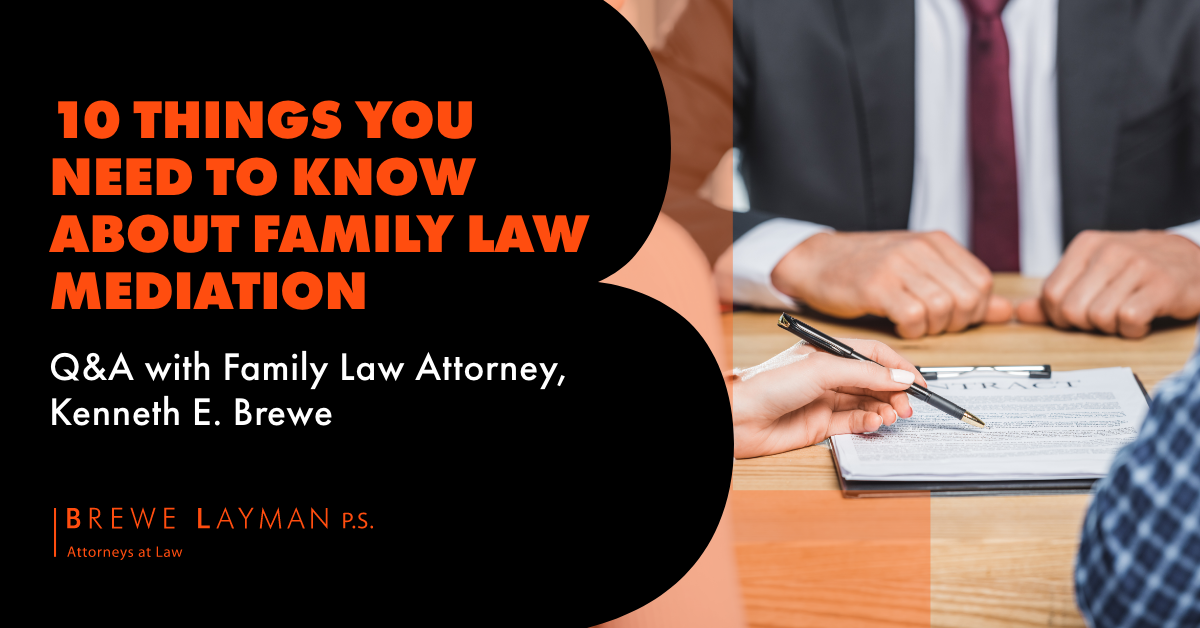10 Things You Need to Know About Family Law Mediation

When it comes to navigating the complexities of familial disputes, seeking an amicable and efficient resolution is often the main priority. Mediation, as an alternative to traditional litigation, has garnered significant attention in recent years.
Its emphasis on open communication, collaboration, and mutual understanding presents families with an opportunity to reach agreements outside the confines of a courtroom.

Ken Brewe, Family Law Attorney
In this interview, we sit down with experienced family law attorney and mediator, Ken Brewe, to shed light on the significance of mediation in the context of family law.
1. What is mediation?
KB: Mediation is a private, structured process focused on resolving disputes/conflicts, utilizing the services of a neutral third party (the mediator), whose role is to facilitate a resolution with the active involvement of the parties. The goal is to arrive at a negotiated settlement.
Typically, parties are present at mediation with an attorney, unless they have elected to represent themselves. The mediator is generally a licensed attorney or a retired judge with extensive family law experience and strong communication and negotiation skills.
The mediator is selected by the parties or their attorneys in most instances and is paid a fee (usually shared by the participants) for services rendered.
2. Why mediate a family law case?
KB: In Washington State, many counties (including King, Snohomish, Pierce, Island, Skagit, and Whatcom) mandate that the parties mediate (or otherwise engage in an alternative dispute resolution process approved by the court) their family law disputes before they can proceed to trial.
Many cases resolve without the necessity of mediation or trial. Most others end up in mediation. The success rate in mediation is fairly high (80%+) when the parties come prepared and are ready to negotiate in good faith.
3. How does the mediation process work?
KB: Prior to the scheduled mediation (which can occur live or via Zoom), the parties’ attorneys will provide the mediator with comprehensive written submissions detailing their client’s settlement position and provide relevant documentation (appraisals, tax returns, business valuation reports, financial statements and reports, child support calculations, parenting plans, forensic or expert reports, etc.).
The mediation is typically scheduled for 4–8 hours. The mediator will have reviewed both parties’ materials in advance. The parties typically (almost always) exchange mediation materials prior to the mediation so that all concerned are ready to go.
4. How do the logistics work on the day of mediation?
KB: Generally speaking, the parties and counsel attend mediation together. They are placed in a conference room (or Zoom breakout room) separate from the other side. The mediator shuttles between the rooms. The parties and counsel do not interact with each other. Exchanges are through the mediator. Breaks for lunch occur as time permits and the parties agree. Occasionally, mediation will extend into the evening if all parties are prepared to extend the day.
5. Can I bring a friend to mediation?
KB: Usually, mediation is limited to the parties and their attorneys. On occasion, the parties and counsel are joined (live, via Zoom, or telephonically) by their forensic experts, accountants, real estate appraisers, or other experts.
Less commonly, the parties may bring along a friend or relative for moral support. It is always a good plan to discuss with your attorney whether such a party will be helpful in the process.
6. What happens if we settle at mediation?
KB: If a settlement or partial settlement is reached at mediation, the parties and counsel will sign a settlement agreement (CR-2A Settlement Agreement), which will bind the parties. The mediator usually drafts the CR-2A Settlement Agreement. With very rare exceptions, courts will enforce the CR-2A Settlements as drafted/signed. There is very limited opportunity to back out of or walk away from a CR-2A Settlement Agreement once it is signed.
The CR-2A Settlement Agreement is then incorporated into the final pleadings, which are filed with the court, and concludes the divorce process.
7. What happens if we do not settle at mediation?
KB: Occasionally, a second mediation is scheduled, or settlement discussions continue between counsel. If not, unresolved issues will proceed to trial for resolution by a judge.
8. Does the judge know what happened at mediation?
KB: No. Issues discussed in mediation are confidential and are not to be disclosed to the trial judge/court if the case is not resolved in mediation.
9. Is mediation useful or productive?
KB: The emphatic answer is yes. The process permits the parties to confidentially take charge of their own destiny (to a certain degree) and resolve their issues without judicial interference or the time, expense, and emotional upset of a trial.
All of the Brewe Layman, P.S. attorneys are experienced and are regularly involved in representing clients at mediation. Having talented and experienced counsel in your corner increases the odds of success.
10. Do Brewe Layman attorneys serve as private mediators?
KB: Yes, we do. Sabrina Layman and I are regularly hired to serve as mediators in family law matters when requested to do so by counsel. We each bring a wealth of family law experience to the table and have honed and developed our mediation skills over many years.
Mediation offers a hopeful solution for families facing disputes, providing a way to resolve issues with compassion and cooperation. We hope this interview has shed light on the benefits of this approach and its potential to create agreeable outcomes and lessen the emotional burden that often comes with litigation for everyone involved.
– – –
QUESTIONS?
Brewe Layman is working diligently, adeptly and tenaciously with new and existing clients to ensure you’re supported throughout the course of your case or matter. We take pride in bringing you experienced and ethical legal representation in a manner that feels surprisingly approachable. If you have any questions or are interested in scheduling an appointment, please use the form below:
Related Links: Family Law / Divorce | Divorce Guides
